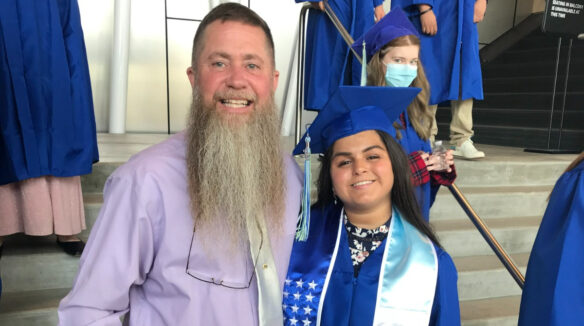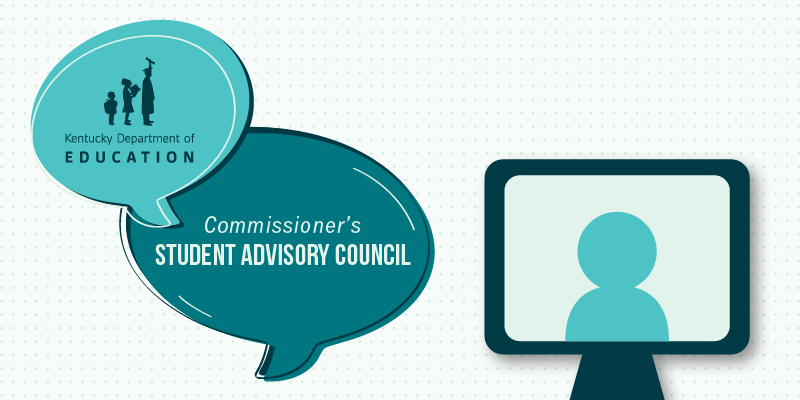
Bill Bates began in the role of exceptional child consultant for the Office of Career and Technical Education on July 15. Bates comes to KDE from Fayette County, where he taught in The Learning Center and the automation engineering career and technical education pathways. Photo courtesy of Bill Bates.
Bill Bates began the role of the Kentucky Department of Education’s exceptional child education consultant for career and technical education (CTE) on July 15. For Bates, a fourth-generation teacher, the position is a dream come true.
“This work excites me, motivates me and moves me each day,” he said. “We have extremely important responsibilities as educators. These roles enable us to do amazing things for students.”
The position is the first of its kind for KDE and was made possible due to federal COVID-19 relief funding from the American Rescue Plan Act. Bates will serve on KDE’s American Rescue Plan Team as a liaison between the department’s Office of Special Education and Early Learning and its Office of Career and Technical Education.
At the Aug. 8 Kentucky Board of Education meeting, KDE Associate Commissioner Gretta Hylton told board members Bates was a “unicorn” in the education field and she was excited to see him step into the role.
“He understands the landscape of special education, but he also understands the landscape of career and technical education,” she said. “The idea behind that was to not only scale up the work we do for any of our students with disabilities in CTE out in the districts or at the ATCs, but also to scale up what we do at the Kentucky School for the Blind and Kentucky School for the Deaf.”
Bates was surprised to find out he was first person to hold the position and that it was unique to have a certification in both special education and career and technical education.
“I didn’t realize how unique those two would be,” he said. “I think you will see more teachers that will get both certifications.”
The vision behind the position is to enhance the experience of students with disabilities in career and technical education by providing additional, targeted supports, along with guidance and technical assistance to local education agencies’ administration and staff and to other state and local agencies.
KDE Associate Commissioner Beth Hargis believes Bates will be a tremendous asset in making sure the needs of student with disabilities that attend area technology centers (ATCs) are met.
“Quite often those students thrive. But the one thing we were missing was that special education professional in the building to help guide us as far as making sure we are implementing their (Individual Education Programs) appropriately,” she said.
Following in the footsteps of his grandmother, dad and late uncle, Bates started teaching because he wanted to make a difference in students’ lives. In college, he realized his passion for CTE and became certified to teach industrial education.
Although there was no “aha moment” through the years of teaching that made him want to earn his special education certification, he said that by having students with disabilities in his CTE classes, he realized they excelled in the environment.
“Students with disabilities are oftentimes leaders in the CTE pathways because they have the opportunity to do hands-on projects and project-based learning, which really fits them more,” he said.
After getting his Rank 1 in in learning and behavioral disorders, Bates began looking for opportunities to merge CTE and special education. In 2017, Bates started working at The Learning Center in Fayette County. In his position, Bates helped create an Automation Engineering CTE pathway that many students with disabilities enrolled in. Students in the pathway worked on projects ranging from posters and magnets to plaques and garden beds. Within each project, they had the ability to choose what they wanted to do.
“You may have some students that want to use drafting equipment and draw their project. Some may want to use the computer and design it. Some students may want to use the power tools. Some students may want to use the laser engraver,” he said. “You have to have options to accommodate what the students’ needs may be.”
Bates said that educators working in both disciplines must have the ability “to understand that an accommodation doesn’t change the curriculum or change the core content of the lesson,” but that educators provide “an avenue so that any student could be successful.”
The goal for Bates in his new position is to help students with disabilities successfully transition to post-secondary education or employment. To do this, he believes in having all parties at the table when it comes to individual education program development, student transition planning, career exploration and pathway placement.
“I think if we can further build this community where CTE and special education are at the table with each other, and then work together to provide accommodations and support for students and teachers, we are going to have great success for students with disabilities completing pathways and passing end-of-program assessments and industry certifications,” he said.



Leave A Comment